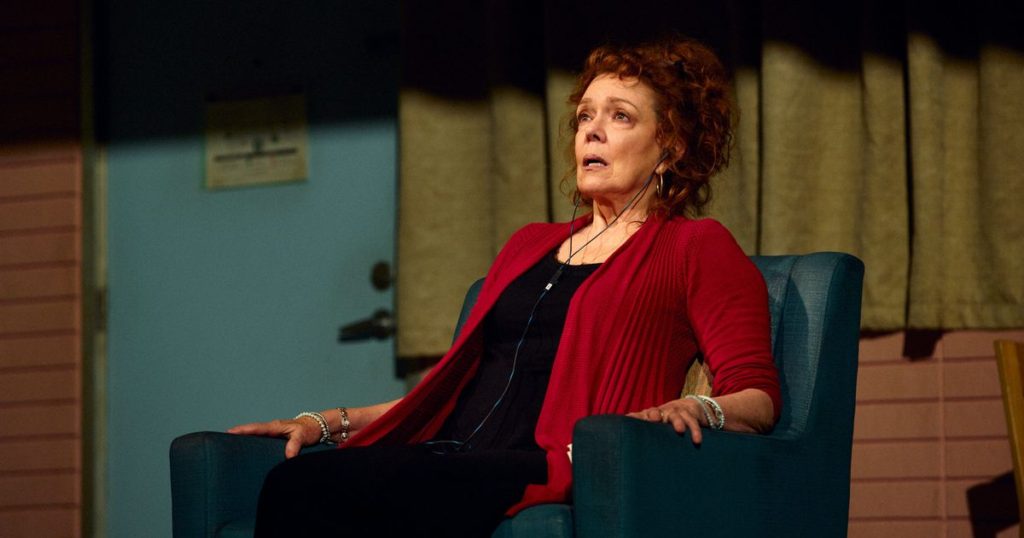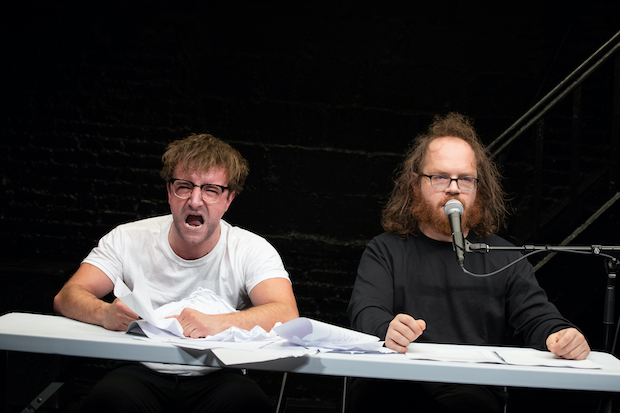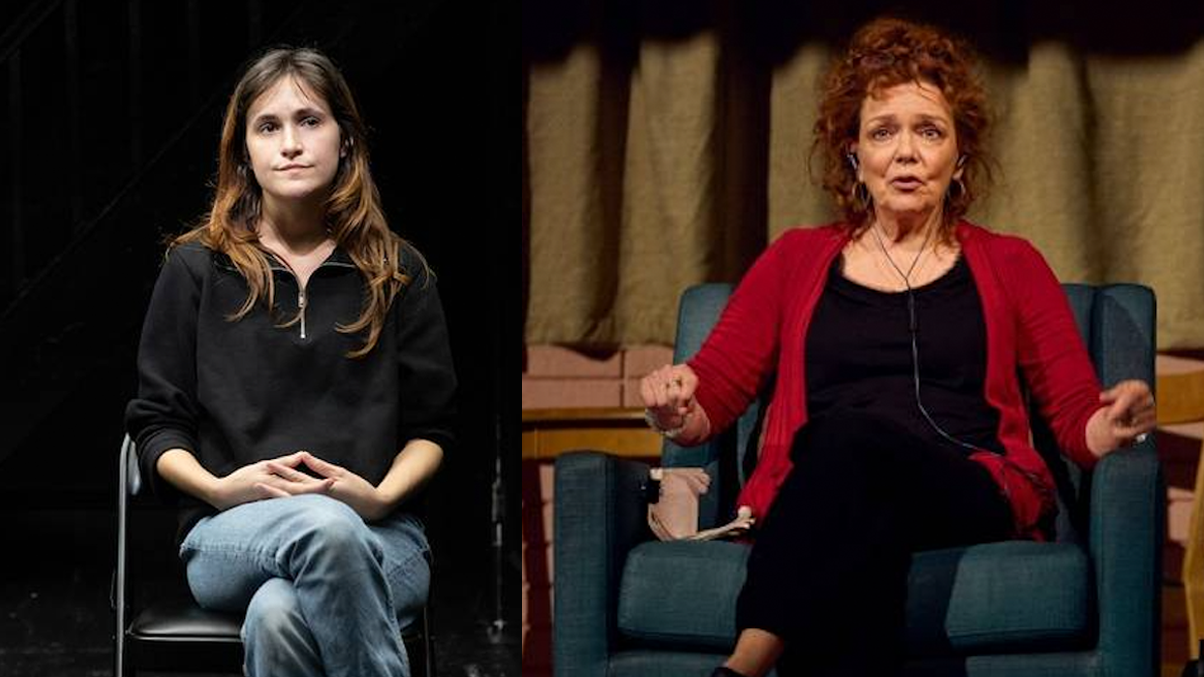Spoilers for both shows to follow.

Two pieces from the pandemic-ridden 2021 New York theater season, Dana H. and While You Were Partying, carry little aesthetic or contextual similarities. Dana H. opened in rep with Tina Satter’s Is This a Room at Broadway’s Lyceum Theater after a successful run at the Vineyard, and originated in interviews conducted with Dana Higginbotham by The Civilians’ Steve Cosson. (The writing credit goes to Lucas Hnath, Dana’s son, for his curatorial and artistic work shaping interviews into a play.) While You Were Partying, meanwhile, was developed in the Soho Rep Writer Director Lab and during a residency at the Baryshnikov Arts Center by writing team Julia Mounsey and Peter Mills Weiss; it enjoyed an off-Broadway run with Brian Fiddyment at SoHo Rep earlier this winter. The non-comparison might have ended at the productions’ temporal adjacence to each other had they not shared a singular, arresting image – that of a woman sitting in a chair while her story plays, separated from her body, on a sound system.
To speak reflectively of either production then feels almost self-sabotaging in its creation of yet another layer of gaze to further obscure the already-well-disassociated true stories at the core of each. But the untangling (or perhaps the futility of the attempt at untangling) of both plays’ dizzy questions around narrative autonomy, body, and truth feels to be part of the experience of each piece. Both plays involve the audience in the extratextual experience of the play, forcing them into spaces of grey and uncomfortable wondering and leaving them there to wade their way out – or drown.
To speak reflectively of either production then feels almost self-sabotaging in its creation of yet another layer of gaze to further obscure the already-well-disassociated true stories at the core of each.
With Dana H. the path to truth is more transparent, in part because the context behind the show is more widely known. Every word comes from Higginbotham herself, either via the interviews conducted by Cosson, or her own writing. This choice is apt, given that the play concerns Higginbotham’s real-life experience of being kidnapped and held hostage by a white supremacist in 1997. The text reveals Dana’s five-month experience and subsequent escape through a haze of motel rooms and back door deals, all the way airing out a policing system that is as ineffective as it is willfully blind.
Questions of autonomy and truth arise most discernibly in the production not from text, but from the show’s conceit and Les Waters’ staging in which an actress (Deirdre O’Connell) lip-syncs to a recording of Higginbotham. The physical body is separated from the narrative; it becomes a vessel which gives performance of the narrative, but which is not the narrative itself. In a culture obsessed with the brutalization and commodification of the female body, Dana H. creates a dissonance which illuminates the horror of the experience over the horror of the brutalization. Dierdre’s empathetic puppetry lives in this zone, bringing forth a sense of dissociation between story and physical experience. It is in this disassociation that the heart of the play lives. Dana H. is always two stories at the same time – one rhetorical, the other physical.
This double-story is further buried in the interior of Dana H. through interrogations of truth and omission. The story at the center of the play is a memory, one very-potentially obscured by trauma and time – and the doubting of the reliability of the narrator becomes an uncomfortable part of the experience of seeing the show. Parallel to the dissonance between body and narrative, there is a dissonance in the spectator of the inside/outside. Inside the narrative, Dana’s story is doubted and outside at the Lyceum, the spectator might find themselves doubting, too. Could such a memory be recalled in complete accuracy? Is the very asking of the question a participation in society’s violent, hegemonic refusal to believe women survivors? Thus, the viewer becomes (perhaps unwillingly) a participant in Dana H.’s labyrinth of narrative and truth. Their own understanding of the conceit of the show develops into an athletic, tangible part of the play itself, one juxtaposed constantly against images of other people who remained uneasily silent or doubting during the five-month ordeal.

Similarly, one of the most imposing relationships of the play is that barely mentioned – that of Hnath and Higginbotham. (Is Dana’s full name, Dana H. Higginbotham, omitted from the title to make clearer her relationship to Hnath, or to further obfuscate it?) Aside from a few passing references to Hnath, Higginbotham’s testimony does not address her relationship with her son before, during, or after the kidnapping. It’s an elephant in the room which looms so noticeably large that one might assume its answer to be in its very omission, or rather in the existence of the play itself. Like the above, it’s a question the audience feels uncomfortable (or even guilty) asking – a still-too-live electric wire which Hnath pokes with his selection of the play’s last line in which Higginbotham says, of the apology from her kidnapper’s family “It kinda felt almost like a family. The way a family should have reacted — if I had one.”
Dana H. is a concealed weapon in that way. It’s a show that presents as a verbatim true story but flowers out into an interrogation of the politics of narrative ownership and the painful intimacies hidden in the empty space of a story.
If Dana H. is a play that conceals its mother/son story underneath a landscape of violence, While You Were Partying serves as its almost exact inverse. Under the lurid mother/son routine in Partying lies a concentrated story of a woman’s self-violence, couched within her relationship to a violent culture.

A tack-sharp explosion of a play, Partying unfolds in three parts. In the first, writer Julia Mounsey sits onstage while her phone plays a recording of her voice into a microphone. She explains on the recording that the story she’s about to tell is true, and that it is prerecorded because it’s difficult for her to tell live without embellishment. (“And I wouldn’t have to memorize it” lands one of the many sandpaper-dry jokes of the night.) The story is of Mounsey visiting a former classmate, Brian, after his suicide attempt. Brian’s Super Mario 64 mods include one of Julia, which prompts an eruption and thrown beer. When asked how she might make-up for the incident, Brian decides “You should write a comedy sketch about my suicide.”
What follows (and what Partying frames as the play itself) is Julia’s draft of the sketch. Brian Fiddyment and Peter Mills Weiss hold pages, sit at a folding table, and play a mercurial vaudeville of Brian and his mother which culminates in a pair of soiled pants (both actors physically handle the excrement) and a titanic, screaming, frothing, physically frightening meltdown from Brian. The deviance from truth in the “sketch” is that Brian does indeed die by suicide. The third part of the play immediately follows Brian in death. He’s assigned Julia’s name, body, and past, and tasked with telling the story of her body. He plugs a pair of earbuds into her still-present phone and, following unheard instructions, sets up a video monitor. The final story of the night is Julia’s, told via Brian, while he moves an avatar of her on the television with a Nintendo 64 controller. Julia tells us (via Brian) that her pelvic tension is so bad she cannot have sex and, in the closest the play ever comes to a straightforward confessional, that she looks at the titular meme of the play (the holy text of self-righteous inceldom) and doesn’t see Brian, but herself.
Partying spins its web from a focused core: staring into the abyss of our contempt for cringe culture and toxic masculinity and having self-violence stare back.
Partying spins its web from a focused core: staring into the abyss of our contempt for cringe culture and toxic masculinity and having self-violence stare back. It hurtles past didactic criticism of inceldom to an ugly and uncomfortable reckoning with our relationship to that culture. Are we violent towards ourselves because we are victims of the culture or because we are slyly members of that culture? This exploration is kaleidoscoped through a further knotted study of body and narrative autonomy. Julia’s story, like Dana’s, is separated from her body. The audience experiences Brian’s story through Julia’s funhouse framing. The Julia avatar looms in the background as Brian, in death, becomes Julia and tells the story of her body. The impotence or transcendent empathy of these choices are left, like much of the grey of the play, with answers and purpose unprescribed – but they give the sly impression that the big, messy ideas of Partying bloom out from a singular investigation of one, intimate body and its autonomy. The script decisively notes “Julia does not speak, but her body must be seen at least once.”
The dizzy autofiction of While You Were Partying extends to the audience’s relationship to the inside/outside. Although Julia’s voice affirms to us that she’s telling a “true story”, doubt creeps in. Would Weiss and Mounsey really have the guts to involve the Brian from the story in the play? How much of Julia’s story is true? Is it appropriate to be asking these questions? Like Dana H., an element of self-policing becomes part of the extratextual experience of seeing the show; Partying pushes you to wonder and to be uncomfortable about the wondering. It’s a unique brand of murky confessional which appears also in Mounsey and Weiss’ previous works 50/50 [Old School Animation] and Protec/Attac. Mounsey and Weiss have developed a sort-of confession that activates the audience, conversations in disgust and wondering that unfold wordlessly, in real time between spectator and performance object.
Rejecting the notion that theater needs to have a conscious relation with the current milieu, or that it needs to have a clear point at all (indeed part of the anarchic glee of Partying is in the singular fact of its ugly, undeniable existence), it is, regardless, not insignificant that two shows have emerged this season concerning grey areas of narrative ownership in trauma. With increasing attention paid to the way in which truth is narrativized by our structures of documentation and reporting, and with a continuing micro-and-macro cultural grappling with our own main character syndromes, both Dana H. and While You Were Partying thrive because they activate the audience to make their own decisions about truth and force them into a space to self-question and to reflect on those decisions. It’s not lost, either, that these are both stories of women victimized by white supremacy and destructive masculinity, and who have in some way internalized a violent structure.
And while some mid-pandemic theater creeps closer and closer to flaccid imitations of sincerity, While You Were Partying and Dana H. ring clear like welcomed screams. In a disrupted time, their unpretentious oddity and thorough aesthetic and philosophical investigations shine light towards what might become the future of effective theater – even if it’s by further muddying the water.
James La Bella (he/him) is a writer and performer currently based in Brooklyn. His writing has been published in the Washington Square Review, The Maine Review and seen onstage at The Tank, The Brick, The Blank, Emerson Stage and more. Jameslabella.com
Extended Play is a project of The Civilians. To learn more about The Civilians and to access exclusive discounts to shows, visit us and join our email list at TheCivilians.org.
Author
-

James La Bella (he/him) is a writer and performer from New England. He earned his BFA from Emerson College, with additional coursework completed at Harvard University. Jameslabella.com
View all posts









